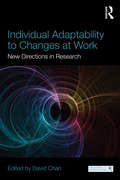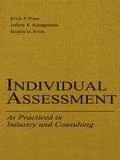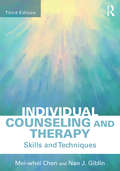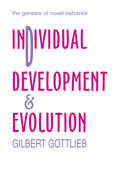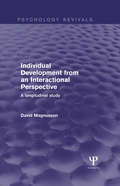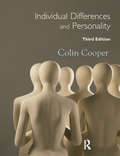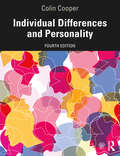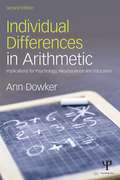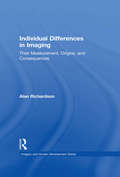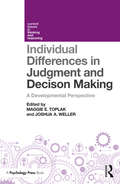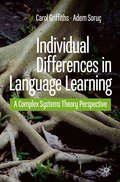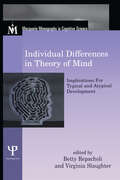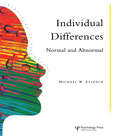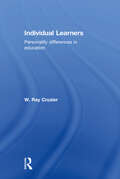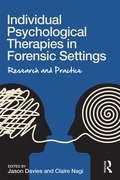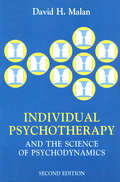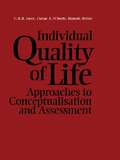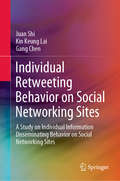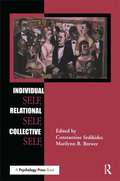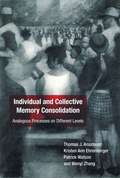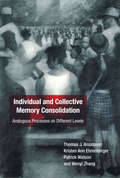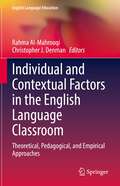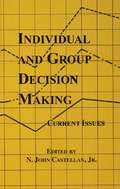- Table View
- List View
Individual Adaptability to Changes at Work: New Directions in Research (Organization and Management Series)
by David ChanIndividual adaptability to changes at work refers to an individual’s response to new demands or ill-defined problems created by uncertainty, complexity, mergers, and any rapid change in the work situation. Today, one of the key factors for an individual’s success is said to be adaptability. In the past two decades there has been increasing interest in the research on individual adaptability, and this is one of the first academic volumes to look at this important topic. Specific contexts examined include work-family conflict, retirement, career management and intercultural interaction at the workplace. The book will provide a comprehensive and integrated analysis of the conceptual, assessment and contextual issues that will help identify the current trends and emerging themes in adaptability research.
Individual Assessment: As Practiced in Industry and Consulting (Applied Psychology Series)
by Kristin O. Prien Jeffery S. SchippmannIndividual Assessment is a professional practice important to Human Resource Managers, Executives and anyone making decisions about employees. Finally, we now have a clear, practical guide with methodologically-grounded descriptions of how to successfully do it. The authors have put together a unique new book with the following key features: *case studies and applied examples showing "how to" conduct individual assessment; *the book provides the reader with a conceptual structure and the research and literature supporting the process; and * it can be used as a text or supplemental text in courses on Personnel Selection, Assessment, Human Resources and Testing. This book will take Individual Assessment to an entirely new level of understanding and practice, and into a new era of professional research and activity.
Individual Counseling and Therapy: Skills and Techniques
by Nan J. Giblin Mei-whei ChenIndividual Counseling and Therapy, 3rd edition, goes beyond the typical counseling textbook to teach the language of therapy from the basic to the advanced. Lucidly written and engaging, this text integrates theory and practice with richly illustrated, real-life case examples and dialogues that demystify the counseling process. Readers will learn how to use winning skills and techniques tailored to serve clients—from intake to problem exploration, awareness raising, problem resolution, and termination. Students have much to gain from the text’s depth, insights, candor, and practicality—and less to be befuddled by while they develop their therapeutic voice for clinical practice. PowerPoints, chapter test questions, and an instructor’s manual are available for download.
Individual Counseling and Therapy: Skills and Techniques
by Mei-whei Chen Zachary D. BloomThe fourth edition of Individual Counseling and Therapy: Skills and Techniques decodes the nuances of therapeutic language and helps students discover their clinical voice.Lucidly written and engaging, the text integrates theory and practice with richly illustrated, real-life case examples and therapeutic dialogues that demystify the counseling process. The therapeutic skills and techniques delineated here will build students' skillsets and deepen their confidence throughout the counseling process—from intake to problem exploration, awareness raising, problem resolution, and finally to termination.Students will delight in the text’s depth, insights, genuineness, and accessibility as they develop and hone their therapeutic voice for clinical practice. An instructor’s manual, PowerPoints, and chapter test questions are available to instructors on the Routledge website.
Individual Development and Evolution: The Genesis of Novel Behavior
by Gilbert GottliebThis work is intended to portray the interrelationship of heredity, individual development, and the evolution of species in a way that can be understood by nonspecialists. In striving to offer a straightforward historical exposition of the complex topic of nature and nurture, the author tells the story through a central cast of characters beginning with Lamarck in 1809 and ending with a synthesis of his own that depicts how extragenetic behavioral changes in individual development could be the first stages in the pathway leading to evolutionary change. On the way to that goal, he describes relevant conceptual aspects of genetics, embryological development, and evolutionary biology in a nontechnical and accurate way for students and colleagues in the behavioral and social sciences. The book presents a highly selected review as a prelude to the description of a developmental theory of the phenotype in which behavioral change leads eventually to evolutionary change. This book grew out of an invited interdisciplinary course of lectures for advanced undergraduate and graduate students at the University of Colorado, Boulder. Presenting the various ways about thinking about heredity, individual development, and evolution, the author had three goals in mind: *to establish the relevance of individual development to the evolution of species; *to describe the most appropriate way to think about or conceptualize heredity in relation to individual development; *to show that this somewhat unorthodox manner of conceptualizing heredity and individual development gives rise to a new way to think about the behavioral pathway leading to evolution. In conclusion, the present work will provide a contribution toward the possible dissolution of the nature-nurture dichotomy, as well as a contribution to evolutionary theory.
Individual Development from an Interactional Perspective: A Longitudinal Study (Psychology Revivals)
by David MagnussonOriginally published in 1988, this title presents a longitudinal research project ‘Individual Development and Adjustment’ (IDA), planned and implemented at the Department of Psychology, University of Stockholm. This title concerns the theoretical background of the project, the planning and collecting of data during the second phase of the project when the participants had reached adulthood, and the presentation of some empirical, illustrative studies based on the collected data.
Individual Differences and Personality
by Colin CooperColin Cooper's 'Individual Differences' has been a favourite among lecturers and students of differential psychology since it was published in 1997. It is unique in its comprehensive coverage of both personality theories and the methodological issues associated with personality and psychometric testing.This new edition has been fully revised and expanded to include recent developments in the field. There is also a new chapter on Emotional Intelligence and expanded coverage of the Big 5 model of personality and positive psychology. Cooper also discusses influential new fields such as cognitive epidemiology and a new chapter on practical applications demonstrates how what has been learned can be applied to everyday life from recruitment to predicting whether psychopaths will reoffend.The accompanying website provides comprehensive support for both students and lecturers, including MCQs, sample exam questions, PowerPoint presentations, revision flashcards, interactive glossary, and revision summaries.An informative and enjoyable trip through personality and psychometrics, this book is essential reading for all students wishing to gain a broad understanding of this fascinating field.
Individual Differences and Personality
by Colin CooperIndividual Differences and Personality provides a student-friendly introduction to both classic and cutting-edge research into personality, mood, motivation and intelligence, and their applications in psychology and in fields such as health, education and sporting achievement. Including a new chapter on 'toxic' personality traits, and an additional chapter on applications in real-life settings, this fourth edition has been thoroughly updated and uniquely covers the necessary psychometric methodology needed to understand modern theories. It also develops deep processing and effective learning by encouraging a critical evaluation of both older and modern theories and methodologies, including the Dark Triad, emotional intelligence and psychopathy. Gardner’s and hierarchical theories of intelligence, and modern theories of mood and motivation are discussed and evaluated, and the processes which cause people to differ in personality and intelligence are explored in detail. Six chapters provide a non-mathematical grounding in psychometric principles, such as factor analysis, reliability, validity, bias, test-construction and test-use. With self-assessment questions, further reading and a companion website including student and instructor resources, this is the ideal resource for anyone taking modules on personality and individual differences.
Individual Differences in Arithmetic: Implications for Psychology, Neuroscience and Education
by Ann DowkerArithmetic is still hugely important in many aspects of modern life, but our personal attitudes to it differ greatly. Many people struggle with the basic principles of arithmetic, whilst others love it and feel confident in their arithmetical abilities. Why are there so many individual differences in people’s performance in, and feelings about, arithmetic? Individual Differences in Arithmetic explores the idea that there is no such thing as arithmetical ability, only arithmetical abilities. The book discusses several important components of arithmetic, from counting principles and procedures to arithmetical estimation, alongside emotional and cognitive components of arithmetical performance. This edition has been extensively revised to include the latest research, including recent cross-cultural and cross-linguistic research, the development of new interventions for children with difficulties and studies of early foundations of mathematical abilities. Drawing on developmental, educational, cognitive and neuropsychological studies, this book will be essential reading for all researchers of mathematical cognition. It will also be of interest to educators and other professionals working within individuals with arithmetic deficits.
Individual Differences in Imaging: Their Measurement, Origins, and Consequences (Imagery and Human Development Series)
by Alan RichardsonContains several suggestions for research and how it can be conducted. This book is useful for people with an interest in the nature and functions of mental imagery.
Individual Differences in Judgement and Decision-Making: A Developmental Perspective (Current Issues in Thinking and Reasoning)
by Maggie E. Toplak Joshua WellerChildren face an overwhelming amount of information and a range of different choices every day, and so there has never been a more important time to understand how children learn to make judgments and decisions in our modern world. Individual Differences in Judgment and Decision-Making presents cutting-edge developmental research to advance our knowledge and understanding of how these competencies emerge. Focusing on the role of individual differences, the text provides a complementary theoretical approach to understanding the development of judgment and decision-making skills, and how and why these competencies vary within and between different periods of development. Sampling a diverse set of developmental paradigms and measures, as well as considering typical and atypically developing samples, this volume provokes thinking about how we can support our children and youth to help them make better choices. Drawing on the expertise of a range of international contributors, this book will be of interest to students and researchers of thinking and reasoning from both cognitive and developmental psychology backgrounds.
Individual Differences in Language Learning: A Complex Systems Theory Perspective
by Carol Griffiths Adem SoruçThis textbook takes a Complex Systems Theory approach to examine individual differences between learners and the potential impact of these variables on the process of acquiring a second language. The authors argue that individual variables cannot provide the complete picture, and that they must instead be understood as part of an interconnected and dynamic system of different factors in order to be useful in a language learning context. Written in an accessible style and suitable for final-year undergraduate and Masters-level students, the book includes clear definitions of key terms, discussion questions for classroom use, practical exercises and activities, and examples of real empirical studies that students and teachers can replicate in their own contexts. This textbook will be of interest to students taking TESOL and SLA courses and modules, as well as those on broader Applied Linguistics programmes.
Individual Differences in Theory of Mind: Implications for Typical and Atypical Development (Macquarie Monographs in Cognitive Science)
by Virginia Slaughter Betty RepacholiOver the last fifteen years, developmentalists, cognitive scientists, philosophers, educators and clinicians have considered the acquisition of a theory of mind - the capacity to predict and explain behavior on the basis of internal, subjective mental states - to be one of the crucial cognitive achievements of early childhood. This volume represents the first collection of work to address, empirically and conceptually, the topic of individual differences in theory of mind. It is also unique because it takes the reader beyond the preschool years, to explore theory of mind development in late childhood and adulthood.
Individual Differences: Normal And Abnormal (Perspectives On Individual Differences Ser.)
by Michael W. Eysenck College, University of LondonA title in the modular "Principles of Psychology" series, designed for A- level and other introductory courses. While normal individuals obviously differ from each other in various ways, psychologists have emphasized differences in intelligence and personality. This emphasis is reflected in the book, and various different views are discussed at length.; Abnormality has always been a source of fascination, although it has been difficult to form a good understanding of why and how abnormality develops. Psychologists have also grappled with other complex issues, such as how to classify abnormal individuals and what forms of treatment will prove beneficial. In spite of complexities, much progress has been made.
Individual Differences: Theories and Applications
by Vivian Shackleton Clive FletcherHow people differ from one another in their behavior.
Individual Learners: Personality Differences in Education
by W. Ray CrozierNo two learners are the same. They take different approaches to learning tasks and they respond to formal education in different ways. Yet the current emphasis in education is on what is common to learners, from a common curriculum to a common teaching method. Individual Learners reviews and discusses recent research that shows that differences in personality contribute significantly to children's and adults' experiences of success and failure in education. Individual Learners considers fundamental issues in the study of personality, and provides an up-to-date review and evaluation of the continuing nature-nurture debate. It then examines five traits that can have an impact upon learning: aggressiveness, anxiety, achievement, motivation, self-confidence and shyness. The book provides an accessible account of the recent research into the links between personality and education and its implications for educational practice. It will be invaluable to anyone with an interest in education, whether students, teachers or lecturers.
Individual Psychological Therapies in Forensic Settings: Research and Practice
by Jason Davies Claire NagiFrom the ‘nothing works’ maxim of the 1970s to evidence-based interventions to challenge recidivism and promote pro-social behavior, psychological therapy has played an important role in rehabilitation and risk reduction within forensic settings in recent years. And yet the typical group therapy model isn’t always the appropriate path to take. In this important new book, the aims and effectiveness of individual therapies within forensic settings, both old and new, are assessed and discussed. Including contributions from authors based in the UK, North America, Europe, Australia and New Zealand, a broad range of therapies are covered, including Cognitive Behavioural Therapy, Mentalisation Based Therapy, Schema Therapy, Acceptance and Commitment Therapy and Compassion Focussed Therapy. Each chapter provides: an assessment of the evidence base for effectiveness; the adaptations required in a forensic setting; whether the therapy is aimed at recidivism or psychological change; the client or patient characteristics it is aimed at; a case study of the therapy in action. The final section of the book looks at ethical issues, the relationship between individual and group-based treatment, therapist supervision and deciding which therapies and therapists to select. This book is essential reading for probation staff, psychologists, criminal justice and liaison workers and specialist treatment staff. It will also be a valuable resource for any student of forensic or clinical psychology.
Individual Psychotherapy and the Science of Psychodynamics, 2Ed
by Lynn Parker David MalanDr Malan's iconic book is firmly established as a classic psychotherapy textbook and it remains extremely popular. The second edition of this highly individual and fascinating text brings theory and practice up to date, while keeping the essential character of the book unchanged.The book offers an invaluable description of dynamic psychotherapy and
Individual Quality of Life
by JoyceThe rubric "Quality of Life" first came to the explicit attention of the medical profession a little over thirty years ago. Despite the undoubted fact that each one of us has his or her own Quality of Life, be it good or bad, there is still no general agreement about its definition, or the manner in which it should be evaluated. Although much has been written about quality of life, this work has been largely concerned with population-based studies, especially in health policy and health economics. The importance of "individual" quality of life has been neglected, in part because of a failure to define quality of life itself with sufficient care, in part perhaps because of a belief that it is impossible to develop a meaningful method of measuring individual variables.The editors of this book believe that the primary focus of quality of life is and must continue to be the individual, who alone can define it and assess its changing personal significance. The challenge of presenting this belief
Individual Retweeting Behavior on Social Networking Sites: A Study on Individual Information Disseminating Behavior on Social Networking Sites
by Gang Chen Kin Keung Lai Juan ShiThis book explores and analyzes influential predictors and the underlying mechanisms of individual content sharing/retweeting behavior on social networking sites (SNS) from an empirical perspective. Since Individual content sharing/ retweeting behavior expedites information dissemination, it is a critical mechanism of information diffusion on Twitter. Individual sharing/retweeting behavior does not appear to happen randomly. So, what factors lead to individual information dissemination behavior? What are the dominating predictors? How does the recipient make retweeting decisions? How do these influential predictors combine and by what mechanism do they influence an individual’s retweeting decisions? Furthermore, are there any differences in the process of individual retweeting decisions? If so, what causes such differences? In order to answer these previously unexplored questions and gain a holistic view of individual retweeting behavior, the authors examined people’s retweeting history on Twitter and obtained a real dataset containing more than 60 million Twitter posts. They then employed text mining and natural language processing techniques to extract useful information from social media content, and used various feature selection methods to identify a subset of salient features that have substantial effects on individual retweeting behavior. Lastly, they applied the Elaboration Likelihood Model to build an overarching theoretical framework to reveal the underlying mechanisms of individual retweeting behavior. Given its scope, this book will appeal to researchers interested in investigating information dissemination on social media, as well as to marketers and administrators who plan to use social networking sites as an important avenue for information dissemination.
Individual Self, Relational Self, Collective Self
by Marilynn B. Brewer Constantine SedikidesThis edited volume addresses key issues relating to the concept of self, an increasingly researched area of social psychology. The self-concept consists of three fundamental self-representations: the individual self, the relational self, and the collective self. That is, people seek to achieve self-definition and self-interpretation (i.e. identity) in three fundamental ways: in terms of their personal traits, in terms of dyadic relationships, and in terms of group membership. Contributions from leading international researchers examine the interrelations among three self-representations. A concluding commentary identifies running themes, synthesizes the extant literature, and points to future research directions.
Individual and Collective Memory Consolidation
by Thomas J. Anastasio Kristen Ann Ehrenberger Patrick Watson Wenyi ZhangWe form individual memories by a process known as consolidation: the conversion of immediate and fleeting bits of information into a stable and accessible representation of facts and events. These memories provide a version of the past that helps us navigate the present and is critical to individual identity. In this book, Thomas Anastasio, Kristen Ann Ehrenberger, Patrick Watson, and Wenyi Zhang propose that social groups form collective memories by analogous processes. Using facts and insights from neuroscience, psychology, anthropology, and history, they describe a single process of consolidation with analogous--not merely comparable--manifestations on any level, whether brain, family, or society. They propose a three-in-one model of memory consolidation, composed of a buffer, a relator, and a generalizer, all within the consolidating entity, that can explain memory consolidation phenomena on individual and collective levels. When consolidation is disrupted by traumatic injury to a brain structure known as the hippocampus, memories in the process of being consolidated are lost. In individuals, this is known as retrograde amnesia. The authors hypothesize a "social hippocampus" and argue that disruption at the collective level can result in collective retrograde amnesia. They offer the Chinese Cultural Revolution (1966--1976) as an example of trauma to the social hippocampus and present evidence for the loss of recent collective memory in mainland Chinese populations that experienced the Cultural Revolution.
Individual and Collective Memory Consolidation: Analogous Processes on Different Levels (The\mit Press Ser.)
by Thomas J. Anastasio Kristen Ann Ehrenberger Patrick Watson Wenyi ZhangAn argument that individuals and collectives form memories by analogous processes and a case study of collective retrograde amnesia.We form individual memories by a process known as consolidation: the conversion of immediate and fleeting bits of information into a stable and accessible representation of facts and events. These memories provide a version of the past that helps us navigate the present and is critical to individual identity. In this book, Thomas Anastasio, Kristen Ann Ehrenberger, Patrick Watson, and Wenyi Zhang propose that social groups form collective memories by analogous processes. Using facts and insights from neuroscience, psychology, anthropology, and history, they describe a single process of consolidation with analogous—not merely comparable—manifestations on any level, whether brain, family, or society. They propose a three-in-one model of memory consolidation, composed of a buffer, a relator, and a generalizer, all within the consolidating entity, that can explain memory consolidation phenomena on individual and collective levels.When consolidation is disrupted by traumatic injury to a brain structure known as the hippocampus, memories in the process of being consolidated are lost. In individuals, this is known as retrograde amnesia. The authors hypothesize a "social hippocampus" and argue that disruption at the collective level can result in collective retrograde amnesia. They offer the Chinese Cultural Revolution (1966–1976) as an example of trauma to the social hippocampus and present evidence for the loss of recent collective memory in mainland Chinese populations that experienced the Cultural Revolution.
Individual and Contextual Factors in the English Language Classroom: Theoretical, Pedagogical, and Empirical Approaches (English Language Education #24)
by Rahma Al-Mahrooqi Christopher J. DenmanThis edited volume examines a number of topics related to the roles of individual and contextual factors in English as second or foreign language (ESL/EFL) settings by presenting chapters across the three sections of theoretical and pedagogical approaches, teacher and learner research, and research into the roles of technology. The book has a focus on practical actions and recommendations related to individual and contextual factors in ESL/EFL, with a specific concern with issues of cognition, metacognition, emotion, and identity, and offers perspectives from a diverse range of international education settings. For teachers of ESL/EFL, the effective recognition and integration of individual and contextual factors into the classroom may represent a significant challenge. This is often the case in those settings where native English speaking teachers work in foreign language contexts where they may have limited understanding of local cultures and languages, or where language instructors have class groups that are culturally and linguistically diverse. In these, and similar, contexts, the types and extent of individual and contextual factors impacting on language learning may challenge both learner and instructor expectations of what an effective and supportive classroom is. While such a situation offers numerous opportunities for learners and teachers to expand their knowledge of themselves and each other, it also presents the possibility for ineffective teaching and learning to occur. It is within this framework that the book presents the latest theoretical, pedagogical, and research perspectives from around the world, thereby providing a resource for all stakeholders with an interest in the roles individual and contextual factors play in the English learning process.
Individual and Group Decision Making: Current Issues
by N. John CastellanThe idea for this volume took root during a recent annual convention of the American Psychological Association. The contributors share a common vision of research in their particular area and have had an opportunity to debate and clarify their ideas. Taken as a whole, the fifteen chapters provide an exciting perspective of the field and form a basic set of readings for courses on individual and group decision making in a variety of disciplines. The coverage from basic laboratory research to complex applied group decision processes should challenge researchers and students to pursue the field of decision making as enthusiastic scientists and practitioners.
